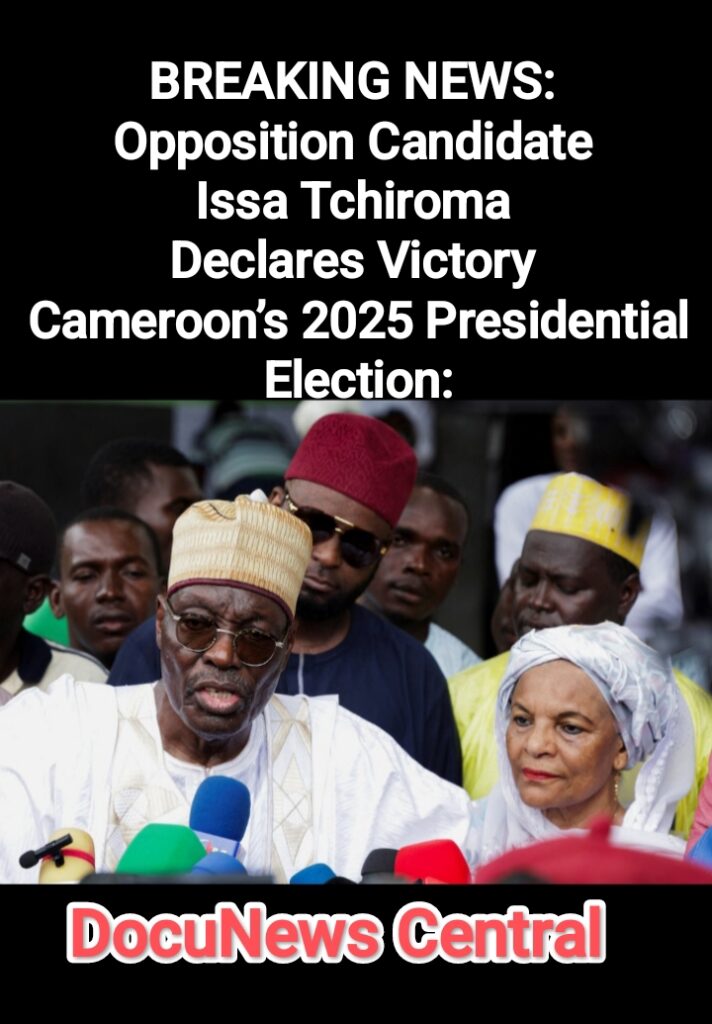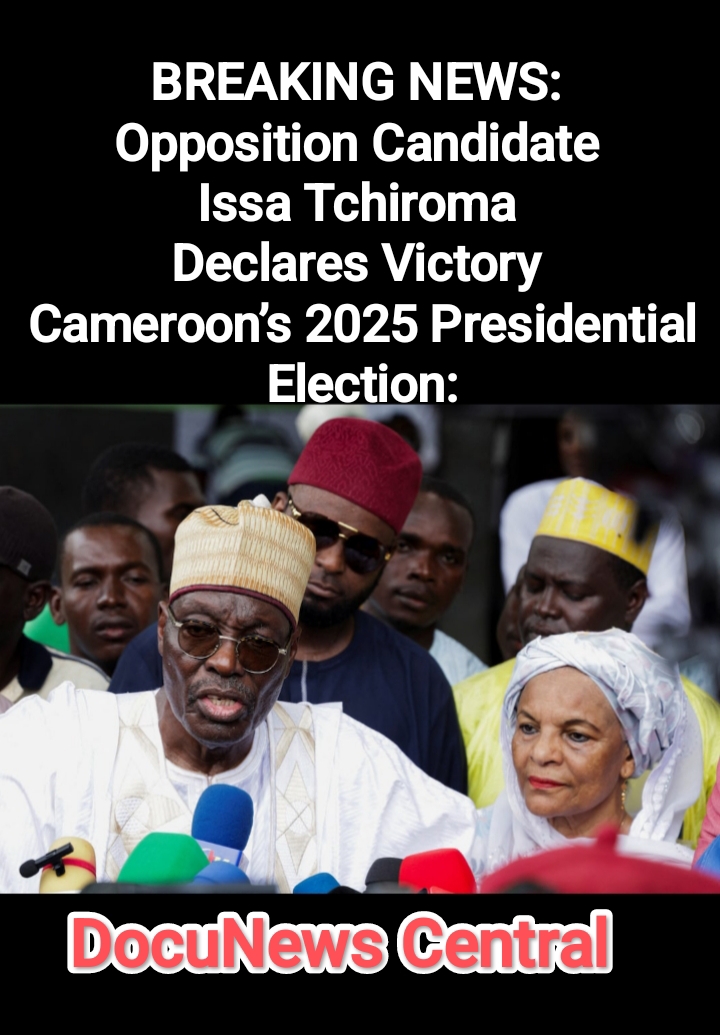
On October 14, 2025, Issa Tchiroma Bakary, a former government minister and leader of the opposition Front for National Salvation of Cameroon (FNSC), declared himself the winner of Cameroon’s presidential election, held two days earlier. This announcement challenges the long-standing rule of President Paul Biya, who has held power for over 43 years, making him one of the world’s longest-serving leaders.
While Tchiroma’s declaration has quickly dominated social media and news coverage, official results from Cameroon’s electoral body, Elections Cameroon (Elecam), and the Constitutional Council are not expected until October 26, 2025. The announcement has sparked a tense political climate, drawing both domestic and international attention.
According to reports from Reuters and AP News, Tchiroma urged Biya to respect the will of the people and warned that failure to do so could trigger unrest. At the same time, the government emphasized that only the Constitutional Council has the authority to declare the winner.
Historical Context: Biya’s 43-Year Rule
Cameroon’s political history is marked by stability under Biya, but also criticism for authoritarian practices. Paul Biya first assumed the presidency in 1982 after the death of Ahmadou Ahidjo, Cameroon’s first president. Over the decades, Biya has maintained power through a combination of political alliances, constitutional amendments, and control over electoral institutions.
Despite international scrutiny and internal dissent, Biya has successfully won successive elections, often amid allegations of vote-rigging and opposition suppression. The 2025 election represents another critical test for Cameroon’s democratic institutions, particularly as public dissatisfaction grows due to economic challenges, rising unemployment, and ongoing conflict in the Anglophone regions.
Who is Issa Tchiroma Bakary?
Issa Tchiroma Bakary is a seasoned Cameroonian politician with a background in government and media relations. He served as a minister and government spokesperson, representing Cameroon on domestic and international stages. Tchiroma has long been regarded as a loyalist of the ruling CPDM party, but tensions over policy and governance prompted him to resign in June 2025.
Following his resignation, Tchiroma became a vocal critic of the Biya administration, citing concerns over centralization of power, corruption, and neglect of national unity. His campaign has focused on institutional reforms, economic revitalization, and national reconciliation, particularly addressing grievances in the Anglophone regions.
According to Al Jazeera, Tchiroma’s sudden prominence in the opposition landscape has energized younger voters and sections of civil society seeking change.
The 2025 Election Process
Cameroon’s presidential election uses a first-past-the-post voting system, where the candidate with the highest number of votes wins, regardless of the margin. This year, 8 million eligible voters were registered to participate.
Electoral preparations were conducted under heightened security, particularly in the Anglophone Northwest and Southwest regions, which have faced armed separatist conflicts for several years. International observers, including the African Union, monitored portions of the election, citing mixed reports of organization and transparency.
Election day reportedly witnessed high voter turnout in urban areas, but rural regions reported logistical challenges, including delayed ballot deliveries and limited access to polling stations. According to AP News, despite these issues, no large-scale violence was reported during voting.
Tchiroma’s Declaration of Victory
On October 14, 2025, Tchiroma uploaded a video on Facebook, declaring himself the winner. He claimed to have secured the majority of votes nationwide and called on Biya to accept the result peacefully.
Tchiroma warned that failure to acknowledge the people’s choice could result in political unrest. He also promised to release regional vote counts to support his claim and counter accusations of illegitimacy. His announcement was reported by multiple news outlets, including Reuters, AP, and BBC Africa, highlighting the growing polarization of the Cameroonian electorate.
Government Response
The ruling Cameroon People’s Democratic Movement (CPDM) quickly rejected Tchiroma’s claim, asserting that he lacks access to official polling data. The Minister of Territorial Administration, Paul Atanga Nji, issued a stern warning, stating that any unauthorized election result announcements constitute “high treason,” emphasizing that the Constitutional Council alone has the legal authority to declare the winner.
Officials maintained that the final election results will be made public by October 26, 2025, in accordance with Cameroonian law. The government also reiterated its commitment to maintaining order and preventing unrest.
Public and Analyst Reactions
Tchiroma’s declaration has elicited mixed reactions across Cameroon:
- Supporters: Small rallies in Garoua and Yaoundé, echoing calls for peaceful transfer of power and accountability.
- Opposition critics: Questioned the legitimacy of Tchiroma’s claim, citing lack of independent verification and potential vote manipulation.
- Political analysts: Suggest the declaration could influence public perception and pressure the ruling party to expedite official communication.
Social media platforms have amplified public debate, with hashtags such as #TchiromaVictory trending in Cameroon and parts of West Africa.
International Perspective
International observers have remained cautiously neutral. While the African Union and United Nations have not officially endorsed any claim, they have called for patience and adherence to legal frameworks.
Observers note that the Cameroon election process remains a barometer for democratic practice in Central Africa, emphasizing that stability depends on respecting constitutional procedures.
Implications for Cameroon
Tchiroma’s bold announcement has national and regional implications:
- Political Stability: Premature victory claims risk escalating tension between government supporters and opposition backers.
- Economic Impact: Investor confidence could be affected if political uncertainty persists, potentially impacting currency stability and foreign investment.
- Social Cohesion: The Anglophone crisis and regional disparities could be exacerbated if perceptions of election illegitimacy spread.
- International Relations: Cameroon’s standing in regional bodies like CEMAC and the African Union could hinge on credible and transparent election outcomes.
Looking Forward
The period between now and October 26, 2025, will be critical for Cameroon. All eyes are on Elections Cameroon and the Constitutional Council, which will officially announce the results.
Political analysts suggest several scenarios:
- Biya declared winner: Could lead to protests from Tchiroma supporters.
- Close contest or disputed results: Might require negotiations or partial recounts.
- Peaceful acceptance by both sides: Could mark a step toward democratic consolidation.
The next days will test Cameroon’s institutions, political maturity, and citizen patience.
Conclusion: A Nation Watching Closely
Issa Tchiroma Bakary’s self-declared victory marks a turning point in Cameroon’s 2025 election. Whether his claim aligns with official results or not, it highlights the growing demand for political accountability, transparency, and reform.
As the nation awaits final results, the focus remains on peaceful resolution, respect for law, and civic responsibility. For continuous updates and in-depth analysis, visit DocuNews Central.
Copyright © 2025 DocuNews Central. All rights reserved.












Can you be more specific about the content of your article? After reading it, I still have some doubts. Hope you can help me.